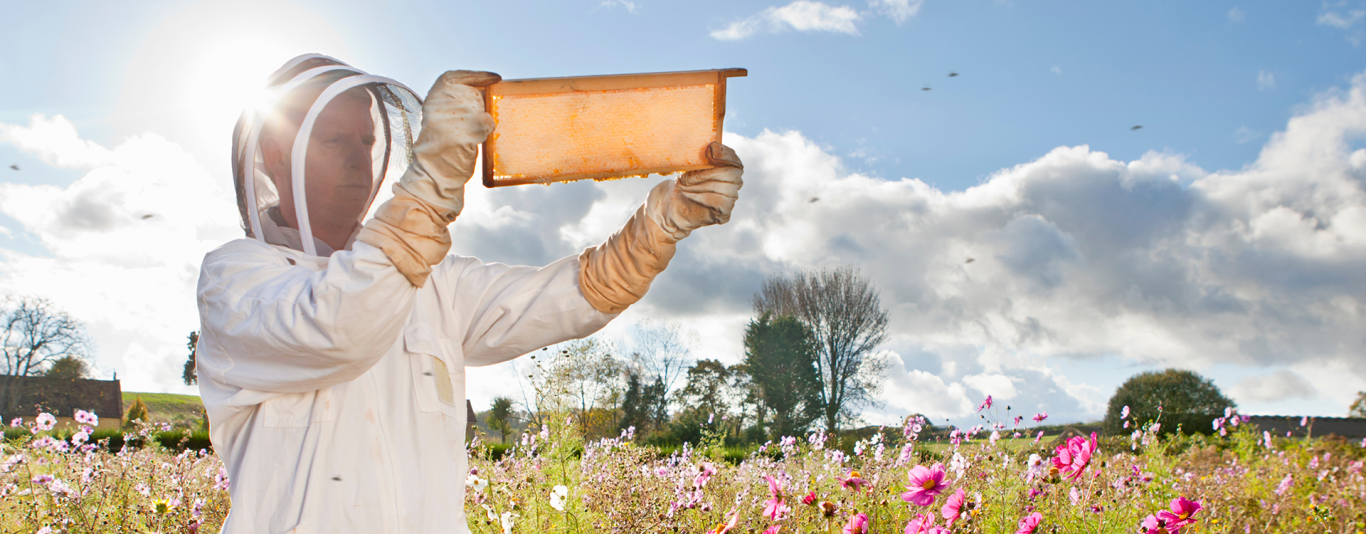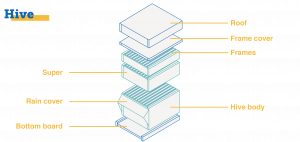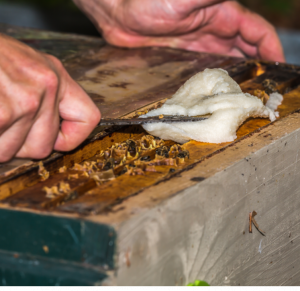News
Tereos offering: Focus on bee feeding

The Group supports beekeepers by expanding its range of bee feeding solutions.
Beekeeping involves collecting what is produced from the hive while ensuring that the bees remain healthy, in particular by providing quality food as a substitute for the honey collected.
But what exactly is at stake? “Collecting honey from hives is a process that requires science and skill”, underlines Olivier Garnier, a Tereos Cooperative member who has installed around 15 hives on his farm in the Seine-et-Marne area, not far from Paris, France. He explains that “the operation is carried out at the end of the nectar collecting season, after checking the honey’s moisture content with a refractometer. Another indicator that the honey is ready to collect is when 75% of the honeycombs are capped in the supers*” (*the super is a box that represents a “floor” of the hive ; as shown on the diagram below)

Beekeepers then collect the honey without touching the hive body, which contains the brood (nursery), and leave a little stock (pollen and honey). Some beekeepers leave a super in place so that a food supply is preserved for the colony.
A complementary feed is often provided by beekeepers: “A quality feed helps the bees to stay healthy and therefore expands their lifespan. Beekeepers can use a less expensive homemade mix of water and sugar, but digesting this mixture is a tiring process as compared to the ‘syrups’ made by professionals”, says Garnier. Spring is the right time to provide targeted feeds called “stimulation”. “Small amounts of ‘syrup’ will stimulate laying, in order to force a population increase in preparation for the first crops, such as rapeseed”.
Solutions for different needs
 Food becomes essential in harsh conditions. Frost, heavy rain or excessive wind will prevent the colony from becoming active and can also lead to a risk of undernourishment if there is no nectar available. The solution? “Feeding them ‘heavy syrup’ will allow them to keep going until the next nectar collecting season”, explains Garnier. “If beekeepers have collected an excessive amount of honey, then feeds of ‘candy’ will allow the bees to survive the winter”.
Food becomes essential in harsh conditions. Frost, heavy rain or excessive wind will prevent the colony from becoming active and can also lead to a risk of undernourishment if there is no nectar available. The solution? “Feeding them ‘heavy syrup’ will allow them to keep going until the next nectar collecting season”, explains Garnier. “If beekeepers have collected an excessive amount of honey, then feeds of ‘candy’ will allow the bees to survive the winter”.
These feeds are made from substitute sweeteners, all of which come from sugar. Tereos supports the beekeeping sector by developing and manufacturing bee feeding products. Of course, this activity is linked to its sugar know-how, but it also relies on the close, on-the-ground relationship between the agricultural and bee sectors.
Tereos has one of the most complete ranges on the market
Bee feeding products contain ingredients from our sugar factories and starch manufacturing plants. With products stretching from entry-level to premium, our range is one of the most complete on the market.

Photo credit : Icko-apiculture.com
All these products are manufactured at several Tereos Group plants (Chevrières, Marckolsheim and Origny-Sainte-Benoîte), using ingredients from our product portfolio. The plants offer up their production lines and industrial know-how.
An exclusive distribution partnership within a solid European network
We have entrusted all distribution of our fondant sugars and syrups to Icko, a customer and partner of Tereos. Founded by the Ickowicz family, it is a European player in beekeeping equipment.

This special partnership with Icko is also another step forwards in Tereos’ constant quest for improvement. The distributor takes over customer returns and forwards them to the cooperative, enabling them to keep developing their products or packaging, for example.
A commitment to the beekeeping sector
Thanks to this exclusive sales contract, Icko is placing bulk orders of several thousand tonnes of our different products. This ensures that Tereos has substantial commercial opportunities.
The products may either be collected directly from Tereos plants by the distributor or delivered to one or more points of sale, as required.
As Tereos embarks on an exclusivity agreement with Icko, it is important to note that the Group remains hugely committed to the beekeeping sector:

